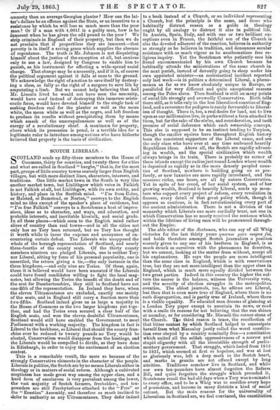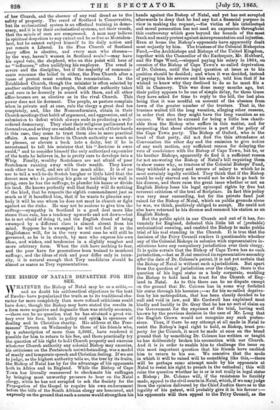SCOTCH LIBERALS..
SCOTLAND sends up fifty-three members to the House of Commons, thirty for counties, and twenty-three for cities and what are called in Scotland "burghs," that is, for the most part, groups of little country towns scarcely larger than English villages, but with more distinct lines, characters, interests, and traditions. One little market town in the South is very like another market town, but Linlithgow which votes in Falkirk is not Falkirk at all, but Linlithgow, with its own entity, and history, and place in the Scottish mind. "I'm from Cane, or Halsted, or Bumstead, or Norton," conveys to the English mind no idea except of the speaker's place of residence, but -"I'm free Falkirk" conveys to a Seotchman a host of impres- sions, ideas as to character, and ways, and education, and probable interests, and inevitable kinsfolk, and social grade. In all these places—which seem to the English mind rather slices of country than real towns—and in all the cities not only has no Tory been returned, but no Tory has thought it worth while to incur the expense and annoyance of en- -countering certain defeat. The Liberals win unopposed the whole of the borough representation of Scotland, and nearly three-fourths of the county seats. Of the thirty county members nineteen are pledged Liberals, one is neither Tory nor Liberal, sitting by force of his personal popularity, one is unsettled, the return giving a tie,—the only instance in the three kingdoms,—and only nine are Tories. Of these, again, three it is believed would have been unseated if the Liberals could have found candidates willing to fight the local mag- nates, but allowing the Tories the benefit of the doubt and of the seat for Dumbartonshire, they still in Scotland have not one-fifth of the representation. In Ireland they have, when the eleven Ultramontanes arc excluded, exactly one moiety of the seats, and in England still carry a fraction more than two-fifths. Scotland indeed gives us as large a majority in the House of Commons as the two larger kingdoms put toge- ther, and had the Tories even secured a clear half of the English seats, and won the eleven doubtful Ultmmontanes, Scotland would still have enabled the Government to meet Parliament with a working majority. The kingdom in fact is Liberal to the backbone, so Liberal that should the county fran- chise ever be reduced to twenty pounds no Tory, would be elected, Conservatism would disappear from the hustings, and the Liberals would be compelled to divide, as they have done in Edinburgh, in order to enjoy the excitement of an election contest.
This is a remarkable result, the more so because of the -strongly Conservative elements in the character of the people. Liberals in politics, the Scotch are by no means Liberals either in theology or in matters of social reform. Although a cultivated scepticism has made great way among the upper class, and a hard form of secularism is very prevalent among the lower, the vast majority of Scotch farmers, freeholder', and ten- pounders are still Presbyterians attached to the "Free" or the " Emden" Assembly, and therefore as much inclined to 'defer to authority as any Ultramontaues, They defer indeed to a book instead of a Church, or an individual representing a Church, but the principle is the same, and those who habitually distrust reason as a guide in theology ought by all analogy to distrust it also in political life. In Austria, Spain, Italy, and with one or two brilliant ex- ceptions even in France, the faithful son of the Church is also the devoted adherent of the reaction, believes in authority as strongly as he believes in tradition, and denounces secular resistance with as much vigour as he anathematizes free re- ligious inquiry. Yet the Scotchman who patiently sees his friend excommunicated by his own Church because he habitually attends the ministrations of the same church in the next parish, instead of devoutly going to sleep under his own appointed minister—an ecclesiastical incident reported only last week—is iii polities a determined Liberal, a pheno- menon as far as we know absolutely unique in Europe, or paralleled for very different and quite exceptional reasons among the Poles alone. Then Scotland is still on many points of social life strongly and avowedly Conservative. Birth tells there still, as it tells only in the less liberalized counties of Eng- land, and a reverence for pedigree is rarely favourable to liberal- ism of thought. There is, too, a real desire for land, not to live upon as our millionaires live, in parks without a farm attached to them, but for the sake of the status, and consideration, and tacit promise of social deference which such ownership conveys. This also is supposed to be an instinct tending to Toryism, though the smaller squires have throughout English history been the consistent supporters of the Liberal cause, and are the only class who have ever at any time embraced heartily Republican ideas. Above all, the Scotch are rapidly advanc- ing in wealth, and the special civilization which wealth always brings in its train. There is probably no corner of these islands except the radius just round London where wealth is deposited so rapidly as in the more densely peopled coun- ties of Scotland, nowhere is building going on so pro- fusely, or new luxuries are more rapidly introduced, and the nouveaux riches, one hears are all by nature Conservative. Yet in spite of her creed, of her social system, and of her growing wealth, Scotland is heartily Liberal, sends up mem- bers who support every project of reform, every revolution in finance, every detail of that great policy which, though it appears so cautious, is in fact revolutionizing every part of the ancient administration. There is not a division of the monarchy which Liberals can more cordially trust, not one in which Conservatism has so nearly received the sentence which within the lifetime of living men will be pronounced through- out the Empire.
The able editor of the Scotsman, who can say of all Whig victories for the last thirty years quorum pars niagna fui, and holds therefore amongst Scotch journalists a position scarcely given to any one of his brethren in England, is as much strack as ourselves with the phenomena he describes, but we cannot, looking at the matter from without, accept all his explanations. He says the people are more intelligent than the same class in England, which is with reservations true, but they are not more intelligent than the upper class in England, which is much more equally divided between the two great parties. Indeed in this country the higher the cul- ture the nearer is the balance, witness the University vote, and the severity of election struggles in the metropolitan counties. The ablest journals, too, he affirms are Liberal, but then that is even more true of England, where there is no such disproportion, and is partly true of Ireland, where there is a visible equality. No educated man dreams of glancing at a London Tory paper except to ascertain its news, or read with a smile its reasons for not believing that the sun shines at noonday, or for considering Mr. Disraeli the corner-stone of the Church. Toe third reason is truer, the recollection of that bitter contest by which Scotland helped to emancipate herself from what Macaulay justly called the worst constitu- tion ever obeyed by a country nominally free—a constitution which united all the selfish oppressiveness of a narrow and stupid oligarchy with all the irresistible strength of parlia- mentary government. That struggle, which lasted from 1815 to 1831, which seemed at first so hopeless, and was at last so gloriously won, left a deep mark in the Scotch heart, and marks in granite are not effaced except by long attrition. Traditions somehow live in Scotland, and while our own ten-pounders have almost forgotten the Reform Bill, and quite forgotten the struggle which preceded it, Scotchmen recall the bad old days when a Tory was nominated to every office, and to be a Whig was to sacrifice every hope of promotion, and become in many districts a kind of social outcast. But the main reasons for the universality of Liberalism in Scotland are, we feel convinced, the constitution of her Church, and the absence of any real dread as to the safety of property. The creed of Scotland is Conservative, but its ecclesiastical system is an effectual training in demo- cracy, and it is by their ecclesiastical systems, not their creeds, that the minds of men are compressed. A man may believe in spiritual despotism to any extent and be as free as Montalem- bert, but he cannot subject himself to its daily action and yet remain a Liberal. In the Free Church of Scotland every office is elective, and every man who chooses— by the way, haven't women in Scotland souls ?—may have his equal vote, the shepherd, who on this point will hear of no "influence," often nullifying his employer. The creed is severe and the discipline, but if the majority of communi- cants renounce the belief in either, the Free Church after a pause of protest must confirm the renunciation. In the Established Church, though the minister is often selected by another authority than the people, that other authority takes good care to be decently in accord with them, and all other office-bearers are as elective as in the rival Church. This power does not lie dormant. The people, as pastors complain when in private and at ease, rule the clergy a great deal too completely, and, like the Nonconformists, obtain in their Church meetings that habit of argument, and aggression, and of submission to defeat which always ends in producing a well- ordered democracy. They elect their religious parliament for themselves, and as they are satisfied with the work of their hands in this case, they come to trust them also in more practical affairs. A. man may believe in Church authority as mach as he pleases, or elevate a book into a deity, but if he is accustomed to tell his minister that his "doctrine is ower oauld," and to consider himself the only authorized expounder of the texts he believes in, he is pretty sure to develope into a Whig. Finally, wealthy Scotchmen are not afraid of poor Scotchmen running away with their wealth. They know each other too well, and are all too much alike. It is of no use to tall a well-to-do Scotch burgher or little laird that- the decent man who is painting his gate or building his wall is going, once he has the suffrage, to plunder his house or divide his land. He knows perfectly well that Sandy will do nothing of the kind, that he respects the eighth commandment just as much as if it benefited him, that if he wants to plunder any body it will be one whom lie does not meet in church or fight against on the rinks. He may not be zealous to give him the suffrage—sympathy in Scotland is a good deal more like steam than rain, has a tendency upwards and not down—but he is not afraid of doing it, and the English dread of being swamped by a different class is almost absent from his mind. Suppose he is swamped; he will not feel it as the Englishman will, for in the very worst case he will still be governed, as he is in church, by men who express his own ideas, and wishes, and tendencies in a slightly rougher and more arbitrary form. When the rich have nothing to fear, and the poor have for generations been trained to manhood suffrage, and the ideas of rich and poor differ only in inten- sity, it is natural enough that Tory candidates should be almost as scarce as Tory representatives.































 Previous page
Previous page